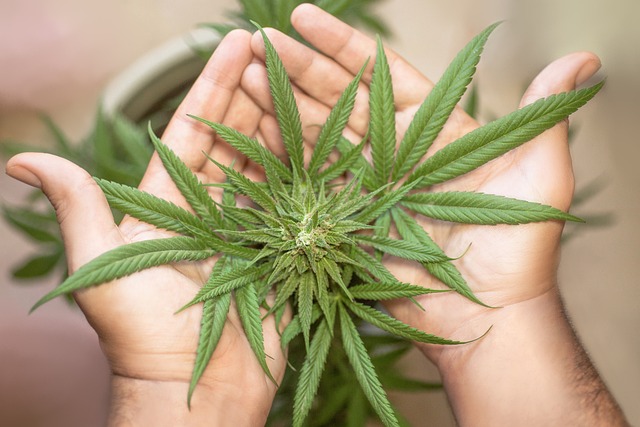2023 has clarified the legality of THCA, a non-psychoactive cannabinoid found in the Cannabis sativa plant, within the United States. THCA, which can convert to THC when heated and is recognized for its potential therapeutic benefits such as anti-inflammatory and analgesic effects, is now a focus of interest alongside Delta-9 THC. As of the current legal landscape, thirty-seven U.S. states have medical cannabis programs that include THCA, with thirteen states plus the District of Columbia also legalizing cannabis for adult recreational use, encompassing both compounds. However, state-specific laws vary in how they regulate THCA, with some allowing its use freely and others imposing restrictions. The legality of THCA flowers specifically can differ significantly from state to state. It is crucial for individuals to stay informed about their local regulations regarding THCA, as these can change with legislative updates. Consumers interested in the therapeutic properties of THCA should consult current laws before purchasing or using THCA-rich products to ensure compliance with local statutes. THCA's legal status in the U.S. is aligned with Delta-9 THC when sourced from hemp compliant with the 2018 Farm Bill, offering a broader spectrum of cannabinoids for wellness and therapeutic use.
Explore the emerging landscape of THCA flower, a non-psychoactive cannabinoid that’s gaining attention for its potential therapeutic benefits and legal nuances across the United States. This article serves as an all-encompassing guide to understanding the multifaceted nature of THCA flowers, from their medicinal properties to cultivation tips, legal considerations, and consumption methods. Dive into the intricate differences between THCA and Delta-9 THC, navigate the complex legal landscape of THCA flowers in the USA, and discover how to source and store these compounds for maximum potency. With a focus on the 2021 Farm Bill and the latest research, this piece also offers practical advice for infusing THCA flowers into topicals, tinctures, and edibles, ensuring you have a comprehensive understanding of this unique cannabinoid.
- Understanding THCA Flower: A Comprehensive Overview
- THCA vs. Delta-9 THC: Key Differences and Effects
Understanding THCA Flower: A Comprehensive Overview

THCA, or Tetrahydrocannabinolic Acid, is a non-psychoactive cannabinoid found in the Cannabis sativa plant that undergoes decarboxylation to become THC, the primary psychoactive component of cannabis. As legislative frameworks evolve across the United States, understanding THCA and its legal status becomes increasingly important for consumers and enthusiasts alike. THCA is often found in raw cannabis flowers and possesses a range of potential therapeutic benefits, including anti-inflammatory, pain-relieving, and neuroprotective properties. Its legality varies by state, with some states permitting the use of THCA-rich products for both medicinal and recreational purposes, while others maintain strict regulations or prohibitions.
Navigating the legal landscape of THCA flowers requires a keen understanding of each state’s laws. As of the knowledge cutoff in 2023, thirty-seven states have comprehensive public medical cannabis programs, with conditions that allow for the use of medical marijuana containing THCA. Additionally, thirteen states and the District of Columbia have legalized cannabis for adult recreational use, which includes products containing THCA. However, it’s crucial to stay updated on local laws, as the legal status of THCA flowers can change with new legislation and interpretations of existing laws. Consumers are advised to verify the current regulations in their specific jurisdiction before purchasing or using THCA-rich products to ensure compliance with state laws.
THCA vs. Delta-9 THC: Key Differences and Effects

Tetrahydrocannabinolic acid (THCA) and Delta-9 tetrahydrocannabinol (Delta-9 THC) are both prominent cannabinoids found in the Cannabis sativa plant, each offering distinct effects and experiences. THCA is the precursor to Delta-9 THC, meaning it converts into Delta-9 THC when heated, a process commonly referred to as decarboxylation. This transformation is significant as it alters their respective effects; while THCA is non-psychoactive, Delta-9 THC is the primary psychoactive component of cannabis. In states where cannabis has been legalized, THCA’s legal status often aligns with that of its counterpart, provided it is derived from hemp compliant with the 2018 Farm Bill, which legalized hemp-derived products with less than 0.3% Delta-9 THC across the United States.
The effects of THCA and Delta-9 THC differ notably. THCA is touted for its potential therapeutic benefits, including anti-inflammatory, anti-nausea, anti-anxiety, and neuroprotective properties, without the psychoactive ‘high’ associated with Delta-9 THC. Conversely, Delta-9 THC induces a psychoactive response characterized by euphoria, relaxation, and altered sensory perception. Users may find that Delta-9 THC is more effective for recreational use or conditions where pain relief, stress reduction, and appetite stimulation are sought. As of the knowledge cutoff in 2023, THCA’s legal status allows consumers in many USA states to explore its potential wellness benefits without the psychoactive effects of Delta-9 THC. This offers a broader range of cannabinoid options for individuals seeking varying levels of engagement with cannabis-derived products.
THCA flower tips represent a nuanced aspect of cannabis, offering a unique experience distinct from its psychoactive counterpart, Delta-9 THC. As explored in this article, understanding the legal status of THCA in the USA is crucial for consumers and enthusiasts alike, as it varies across different states. The comparison between THCA and Delta-9 THC reveals their different effects and potential benefits, highlighting the importance of informed consumption. Whether for therapeutic purposes or recreational enjoyment, the insights provided here aim to enhance the user experience responsibly within the bounds of the law.
